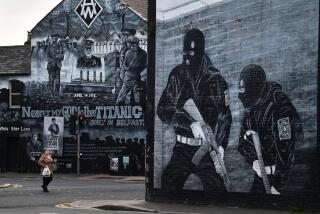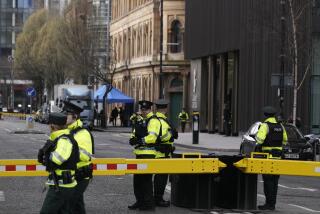British Rule Is on Trial in S.F. : Courts: Extradition of Irish nationalist hinges on whether Britain can prove it does not persecute Catholics. Man is a prison escapee.
- Share via
SAN FRANCISCO — For the past two weeks, British officials and Irish activists have squared off in federal court here in an unusual extradition hearing that has turned into a challenge of British rule in Northern Ireland.
In proceedings that sometimes resemble the World Court, an undersecretary of state, a brigadier general, a prison governor, a member of Parliament and Irish radical Bernadette Devlin McAliskey have taken the witness stand to debate British policy in the province.
Seeking to extradite an Irish nationalist convicted of attempted murder who escaped from prison 10 years ago, Great Britain is required to prove to a United States judge that it does not persecute Catholics in Northern Ireland.
Britain’s bid to return James Joseph Smyth to prison in Belfast is the first test of a revised Anglo-American extradition treaty and its narrow exception for political fugitives.
At issue is the contention that Smyth, who fled to San Francisco and quietly took up a new life as a house painter, would be persecuted for his beliefs if he is taken back to Northern Ireland to serve the rest of his 20-year sentence.
Closely watched by the British press, the monthlong hearing is focusing new attention on allegations that British forces have maintained a “shoot-to-kill” policy against suspects who are Catholics and engaged in collusion with loyalist paramilitary death squads.
After the British government refused to turn over key documents in the case, U.S. District Judge Barbara A. Caulfield ruled that the burden is on Britain to prove that Smyth would not be the victim of retaliation if he is extradited.
British authorities say Smyth is little more than a common criminal who should be returned to serve out his sentence. But halfway through the proceedings, none of the government witnesses have so far been willing to guarantee that Smyth would not face retribution if returned.
McAliskey, the fiery former member of Parliament who was wounded in an assassination attempt in 1981, testified that she believes Smyth would be subject to harassment and possibly death if he is extradited.
For Smyth, 39, the extradition hearing is a chance to become a spokesman for the Irish republican cause and focus international attention on what he calls “the Irish War.”
The intense, soft-spoken fugitive has become a hero in San Francisco’s close-knit Irish-American community and his supporters pack the courtroom every day.
“I’m going to show the court and this country that we’re not the terrorists, we’re the oppressed people,” he said during a break in the proceedings. “I want to use my case to show the truth and bring peace to the country.”
The province of Northern Ireland has been under direct rule from London since the early 1970s when clashes between Protestants and Catholics prompted the British government to send in troops and suspend the Northern Ireland parliament. The military still maintains a strong presence in the region and civil rights have not yet been fully restored.
A native of Belfast, Smyth was arrested in 1977 for attempting to murder a prison official. According to the legal finding by Judge Caulfield, eyewitnesses could not identify Smyth, and his fingerprints were not found at the scene. He was convicted on the strength of testimony from the arresting officer, who came across Smyth a mile away wearing clothes like those worn by one of the suspects.
Incarcerated at the infamous Maze Prison in Belfast, Smyth joined in a 2 1/2-year protest in which republican prisoners refused to wear clothes or leave their cells, even to use the toilet. His cellmate was one of 10 prisoners who died in 1981 in a subsequent hunger strike.
In a brazen 1983 escape, Smyth and 37 other prisoners commandeered a truck and broke out of the Maze. He reached San Francisco the next year, found work painting houses and married an American woman he met in an Irish pub.
Using a false passport, he traveled to Ireland three times before he was arrested last year outside his home in San Francisco. Two other Maze escapees also have been arrested in California: Kevin Artt in San Diego and Pol Brennan in Berkeley. Their fate hinges largely on the outcome of Smyth’s hearing.
Smyth, who Caulfield found was interned by British authorities for a year without charges while a youth, denies that he belongs to the outlawed Irish Republican Army but says he is a member of Sinn Fein, the legal political party that backs the nationalist cause.
As it happens, both sides in the case are represented by separate arms of the United States government; the U.S. attorney’s office is representing the British government while Smyth’s defense is being handled by the office of the federal defender.
In his bid to avoid extradition, Smyth is testing a treaty between the United Kingdom and the United States that was rewritten by the two governments in 1986 to prevent Irish terrorists from winning political asylum here.
At the insistence of Congress, an escape clause was added to the treaty permitting a fugitive to remain here if he can prove he would be persecuted in Britain because of his race, religion, nationality or political opinions.
Earlier this year, Smyth’s defense sought to obtain two classified reports of British government investigations into the alleged shoot-to-kill policy and collusion with loyalist paramilitary groups.
Britain’s refusal to let Caulfield review the documents in private prompted her to issue two legal presumptions: that Irish republican defendants are subject to systematic retaliation or death, and British forces “participate in or tacitly endorse” such retribution.
In response, Britain has called a series of top officials to the stand to refute the presumptions and testify that the government is even-handed in its administration of the province of Northern Ireland.
John Chilcot, British undersecretary of state for Northern Ireland, testified that the government is working to end discrimination in Ulster with the goal of bringing peace to a “deeply divided society.”
“We stand in the middle,” Chilcot said. “Our aim is to protect lives, protect property and protect the individual.”
Under cross-examination, however, Chilcot refused 16 times to answer questions about whether British forces had a shoot-to-kill policy in Northern Ireland.
Brigadier Gen. Alister Irwin, in charge of troops in Belfast, and Wilford Monahan, an assistant chief of the Royal Ulster Constabulary, testified that their forces do not engage in the persecution of Irish nationalists.
Maze Prison governor John Baxter, testifying that nationalist inmates are not subject to discrimination, told the court: “No prisoners are at risk in the Maze Prison.”
Under cross-examination Baxter acknowledged that guard dogs were set on prisoners in the aftermath of the Maze escape and that the inmates’ wounds went untreated for two weeks. Guards involved in the attack were later promoted, he acknowledged.
Smyth’s defense, contending that the British government has not proved its case, asked Caulfield to throw out the extradition request, a motion she took under consideration.
“They deny they have a policy (of discrimination), but when asked about their practices they refuse to answer the questions,” said his attorney, Karen Snell. “I feel we should win even if the judge didn’t listen to a bit of our evidence.”
The defense has sought to make its case by calling Catholic residents of Northern Ireland whose family members have been killed by loyalists or the security forces.
Also coming to Smyth’s defense, Labor Party Member of Parliament Ken Livingstone testified that government forces have an unofficial shoot-to-kill policy in Northern Ireland and that there is collusion between some members of the security forces and loyalist paramilitary groups.
“It’s accepted in Parliament that these things happen--the assassinations of republicans and the drifting of arms from the military into the hands of loyalists,” he told the court.
More to Read
Sign up for Essential California
The most important California stories and recommendations in your inbox every morning.
You may occasionally receive promotional content from the Los Angeles Times.













